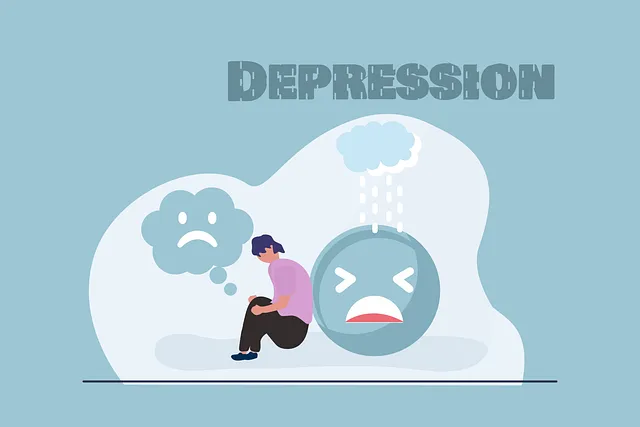Risk assessment and harm minimization planning are crucial for creating safe communities like Wheat Ridge, with a focus on mental health. Kaiser's comprehensive mental health coverage in Wheat Ridge includes various services like social skills training and depression prevention programs. Effective strategies involve identifying local risks (e.g., accessibility, financial barriers) and existing safety nets, while promoting mental health awareness to reduce stigma. Combining professional therapy with self-care practices like Compassion Cultivation Practices (CCP) empowers residents to manage stress and anxiety, utilizing Kaiser's resources for proactive mental well-being. "Wheat Ridge does Kaiser cover mental health therapy" is a key query addressed by these initiatives.
In today’s complex healthcare landscape, understanding risk assessment and harm minimization planning is paramount. This article guides you through essential practices, focusing on how Kaiser’s mental health therapy coverage in Wheat Ridge can support these processes. We’ll explore key components of a comprehensive risk assessment and effective strategies for harm minimization planning. By delving into these topics, individuals and organizations can enhance their ability to navigate and mitigate risks, ensuring better outcomes for all involved. Moreover, understanding Kaiser’s coverage in Wheat Ridge offers valuable insights for those seeking mental health support.
- Understanding Risk Assessment and Harm Minimization Planning
- Kaiser's Mental Health Therapy Coverage in Wheat Ridge
- Key Components of a Comprehensive Risk Assessment
- Strategies for Effective Harm Minimization Planning
Understanding Risk Assessment and Harm Minimization Planning

Risk assessment and harm minimization planning are essential components of any comprehensive strategy aimed at ensuring safety and well-being in various settings, including communities like Wheat Ridge. This process involves identifying potential risks and hazards that could lead to harm or adverse outcomes, and subsequently developing proactive measures to mitigate these risks. By systematically evaluating these factors, organizations and individuals can create environments that are safer and more supportive for all.
When it comes to mental health and therapy, Wheat Ridge residents should know that Kaiser often covers a wide range of services, including social skills training, positive thinking strategies, and depression prevention programs. Understanding the risks associated with mental health issues is crucial, as left unaddressed, they can lead to more severe consequences. Therefore, harm minimization planning includes making these therapeutic interventions accessible to those in need, ensuring that individuals receive the support required to navigate and overcome challenges related to their mental well-being.
Kaiser's Mental Health Therapy Coverage in Wheat Ridge

In Wheat Ridge, Kaiser’s Mental Health Therapy Coverage offers a comprehensive array of services designed to support individuals in managing and improving their mental well-being. The organization recognizes the importance of addressing emotional regulation and inner strength development as key aspects of overall health. As such, their coverage includes access to various therapy options, ensuring that residents have the necessary support for their mental health journeys.
This commitment extends beyond traditional therapy sessions, reflecting a broader focus on public awareness campaigns development. Kaiser’s Wheat Ridge location aims to foster an environment where individuals feel empowered to seek help and engage in practices that enhance emotional resilience. By covering mental health therapy, Kaiser plays a pivotal role in promoting the well-being of the community, acknowledging that emotional regulation is not just a personal concern but a societal priority.
Key Components of a Comprehensive Risk Assessment

When conducting a comprehensive risk assessment for any initiative or program, especially those focused on mental health and well-being, several key components must be considered. The process should begin with a thorough identification of potential risks and hazards specific to the context, such as those related to access to mental health services in areas like Wheat Ridge. This includes evaluating factors like geographical accessibility, financial constraints, and cultural barriers that might affect individuals’ ability to seek help. For instance, understanding whether Kaiser covers mental health therapy in local plans can significantly impact service utilization.
Additionally, a robust risk assessment should incorporate an analysis of existing safety nets and support systems. This involves assessing the availability and effectiveness of services like Social Skills Training and Emotional Well-being Promotion Techniques. By examining these elements, planners can identify gaps that need to be addressed through harm minimization strategies. Incorporating Mental Health Awareness campaigns as part of this process ensures that risks related to stigma and misinformation are also mitigated, fostering a more inclusive and supportive environment for those in need.
Strategies for Effective Harm Minimization Planning

Wheat Ridge residents often wonder: does Kaiser cover mental health therapy? Effective harm minimization planning involves a multi-faceted approach that integrates both professional support and self-care strategies. One key element is incorporating Compassion Cultivation Practices (CCP), which have been shown to reduce stress, anxiety, and promote emotional well-being. CCP includes mindfulness exercises, empathy-building activities, and practices for cultivating loving-kindness, all of which can be easily integrated into daily routines.
Additionally, Self-Awareness Exercises play a crucial role in harm minimization. Regular reflection on thoughts, emotions, and behaviors allows individuals to identify triggers and develop personalized coping mechanisms. This proactive approach, coupled with access to mental health resources like those provided by Kaiser (if covered), can significantly enhance one’s ability to manage stress, prevent escalation of issues, and promote overall resilience. For instance, techniques such as deep breathing exercises and cognitive reframing can offer immediate anxiety relief in challenging situations.
Risk assessment and harm minimization planning are vital components of ensuring safety and well-being, especially in healthcare settings. As Wheat Ridge residents explore their mental health options with Kaiser’s comprehensive coverage, understanding these processes is crucial. By evaluating risks and implementing effective strategies for harm minimization, Kaiser can provide a secure environment for therapy. This approach not only respects patient needs but also aligns with the evolving standards of care in the field of mental health treatment.






